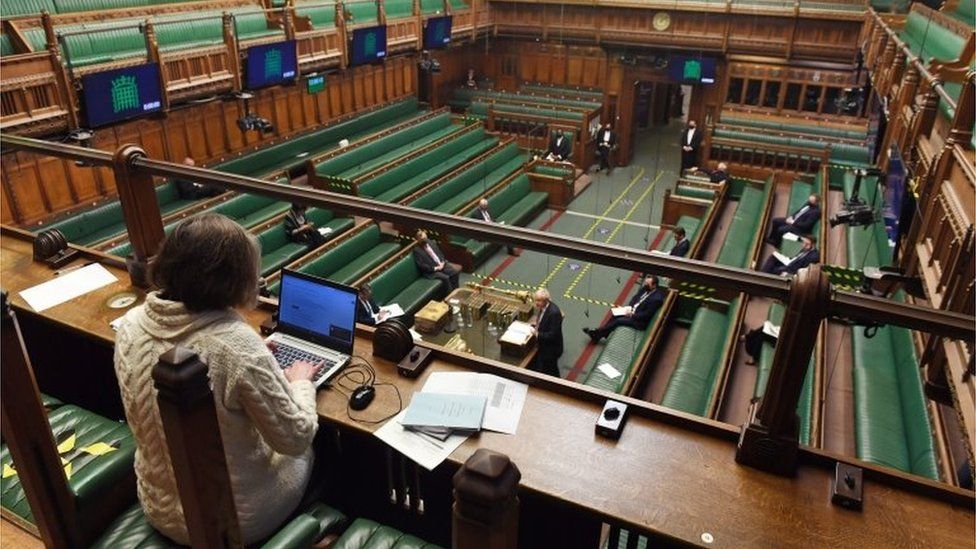Should the House of Commons take back control of the agenda?
- Published

In any game, the rulebook matters, and, after two tumultuous years, pressure is growing to rewrite the Commons' rulebook - its standing orders - to loosen the government's grip on when MPs sit and what they debate.
It is startling, but true, that MPs don't control when they meet - remember the clamour for a recall of the Commons over Christmas?
Their agenda is mostly controlled by the government, and they can't even vote on their own rules unless the government provides debating time, as became painfully clear last May, when they were given no opportunity to vote on whether or not to keep online voting, after ministers decided to get rid of it.
That control over the Commons really bit during the intricate parliamentary battles over Brexit - most spectacularly when the Supreme Court overturned Boris Johnson's attempt to prorogue or suspend Parliament, which was done without any vote while MPs were in recess.
The root of the problem was that a government which lacked an overall majority found itself doing battle with what amounted to a cross-party Remain majority in the Commons - but the control given to it by standing orders was still so strong that it required some exotic manoeuvres by then Speaker John Bercow, stretching some parliamentary conventions well beyond breaking point, to overcome ministerial power over the agenda.
More recently that control was felt again as MPs became increasingly uncomfortable about the level of scrutiny they were able to bring to bear on pandemic measures which had major implications for individual freedom, but had to wait for ministers to schedule debates.
It resulted in a show of strength by Conservative backbenchers in the so-called Brady amendment, which led to ministers promising more timely scrutiny.
So for the last couple of years the constraints on the House of Commons have become a major issue.
The House has less autonomy than most parliaments - less, for example than the Scottish Parliament, and far less than the US Congress.
In Westminster it's ministers, not MPs, who call the shots on the workings of the Commons.
Which is where this report, by the authoritative UCL Constitution Unit, comes in.
The report co-authored by Meg Russell and Daniel Gover argues that decision-making about the work of the Commons should be controlled by a majority of MPs, not by the government - and that recent events have shown that governments don't always command a majority.
They recommend a series of detailed changes, but the key one is that the Commons takes back control of its agenda (their phrase) by the simple means of allowing MPs vote to approve it, or change it.
At the moment, under Standing Order No 14, which dates back to 1902, the Commons agenda is controlled by the government, apart from days provided (with the timing controlled by the government) for Opposition Day debates, Backbench Business Committee debates and for debates on private members' bills.
'The balance of power'
So, at present the government simply announces the agenda for the coming week, every Thursday.
But make this a vote-able and amendable motion, and, the authors argue, at a stroke, the government would be forced to become much more willing to accommodate concerns of backbench MPs.
And it would mean that if a majority of MPs wanted, for example, to debate a return to online voting, they could at least put it on the agenda.
This may sound very technical but it is fundamental to the balance of power between the House of Commons and the government.
The report also proposes that Parliament should vote on any prorogation, and that there should be some process to allow MPs to recall the Commons, if some urgent matter crops up during a recess, as happened over the Christmas break.
And, crucially, it suggests that the time has come for a review of the rules, perhaps by a special committee, perhaps led by the Speaker.
That harks back to the Wright Committee, set up in the backwash of the expenses scandal, which recommended the creation of backbench debates, and elections for seats on select committees.
It also recommended a House Business Committee to marshal the rest of the Commons agenda, but that plan was abandoned by the coalition government, never to resurface.
And the government's position hasn't changed since - a spokesman said: "We will not be bringing forward proposals to establish a House Business Committee as the electorate decides at a general election who controls debate in the House of Commons.
"The government is committed to providing opposition and backbench time whilst ultimately delivering its legislative programme - which it is elected to do."
'Gridlock'
That is hardly encouraging for the writers of this report.
No government, of any stripe, wants to reduce its own powers, and ministers will have real concerns that the proposals may allow opponents to mire their legislation in gridlock.
But the Constitution Unit has an impressive batting average in encouraging constitutional changes, and one of the report's co-authors, Professor Russell, has advised on every major reform of parliament - actual or proposed - since the New Labour years.
And such has been the level of backbench concern about the Covid restrictions, it's just possible that a majority of MPs might be mobilised, in favour of these changes.
The catch-22 is that the current Commons rules make it very hard for, even, a majority to make changes, without the support of the government.